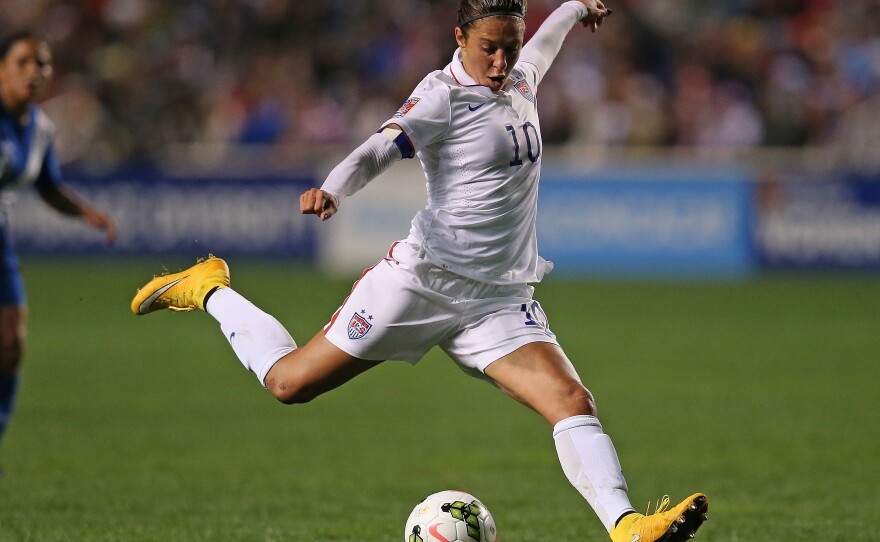Carli Lloyd doesn't "do fake."
"I'm loyal, I'm real, I'm not afraid to say what I'm thinking," she tells NPR's David Greene.
In her new memoir, When Nobody Was Watching, Lloyd describes the journey that led her to become one of the world's best soccer players.
Her victories have been hard-fought — Lloyd's training began in the small, working class town of Delran, N.J.
"I used to kick the ball up against the curb for hours upon hours," she recalls. She'd gather all the soccer balls she could find, head over to the field, and work on her shot.
"That's when you know that someone is passionate about something," she says. "You don't have to force them to go out and train."
But Lloyd's passion for the sport has come with sacrifice. Her parents are loving and supportive, she says, but their relationship is strained and she has not seen them since 2014.
Lloyd talks with Greene about the highs and lows of her career — including the time she nearly quit playing soccer entirely.
Interview Highlights
On media attention she has received
For so long, I've been a little misunderstood as a person. I do have this strut about me — I don't know if it's the Jersey girl in me. I like to think of myself as an egg: hard on the outside but soft on the inside.
On whether there's more pressure for a female athlete to maintain a tough exterior
I want to intimidate people when I'm on the field. I want people to be scared of me. That's just ... who I am as a person and player. But I also know that you have to be emotional. You have to be in touch with your feelings — I think that's important. But I think being a competitive person by nature, as a female, is something empowering and that's kind of how I've been my entire life.
On nearly quitting soccer altogether when she was in college
I think for so many years I relied on my talent. I didn't have someone who really spoke the truth — told me that I wasn't fit, told me that I'm not a good teammate, I don't have good character: all of those things that are necessary at the top. ... I made a lot of excuses, it was everybody else's fault.
I didn't know how to deal with criticism, so getting cut from the [U.S. Women's National] Under 21 team was the first moment where I had to really deal with some sort of criticism. And I figured I'd just quit. ... I didn't know how to face adversity.

On falling out of touch with her parents, whom she credits with much of her success
My family meant everything to me. I was super close with them, super engaged, we made decisions together. And as I started to get older, I wanted to make my own decisions. I was just dying to ... grow up and become an adult and we started to butt heads. And I think it's very hard for parents to let their kids fail. To let them grow up, to have me make all these decisions of an agent, signing endorsements, it was just really hard for them.
On why she wishes her parents had pushed back on her more
I thought of myself as this princess who could do no wrong and that wasn't the case. I never looked in the mirror and said to myself: I need to be better. And yes, I think that you always want to side with your kid, but at the same time, you don't want to do that if it's going to derail them to becoming better.
On her decision to discuss her relationship with her parents in the book
I emailed my parents just to let them know, obviously, that my book is coming out and I really do hope they read it, because I think they will see that — how saddened I am by all of this. It was hard to come to terms with whether to put this in my book or not, but it's part of my journey, and I think that I'd be lying to readers if this wasn't in there.
On whether she feels pressure to be a role model for younger players
I don't. ... I am who I am. I'm not having to go outside and switch the role model hat on. It's me. It's important for me to leave that legacy to help inspire younger players because I didn't have a role model growing up.
Copyright 2023 NPR. To see more, visit https://www.npr.org. 9(MDAzMjM2NDYzMDEyMzc1Njk5NjAxNzY3OQ001))






